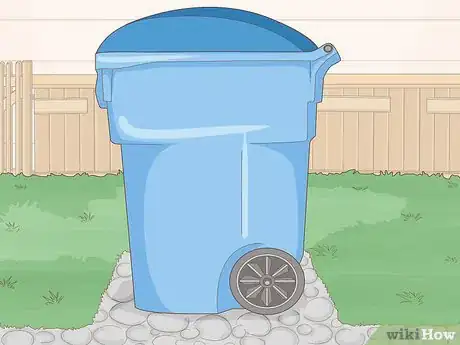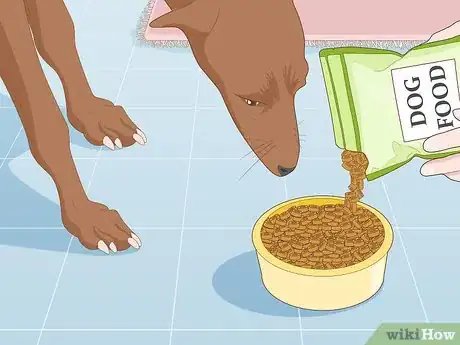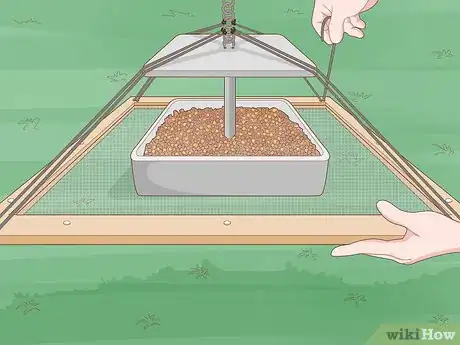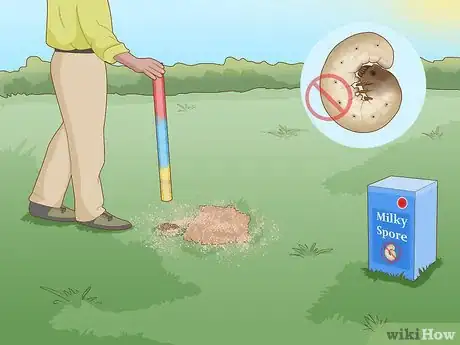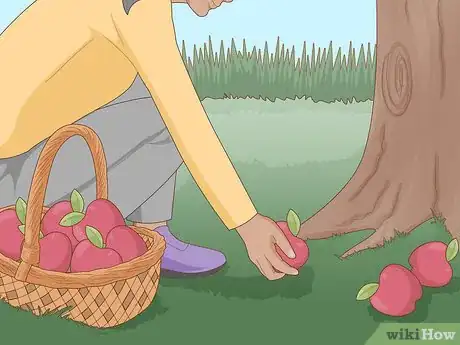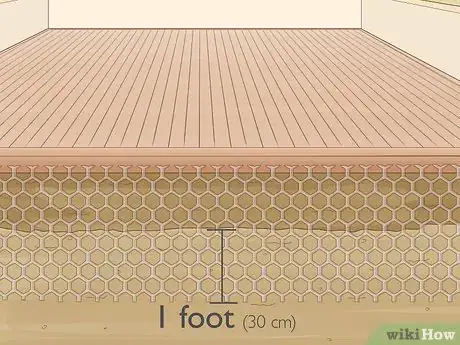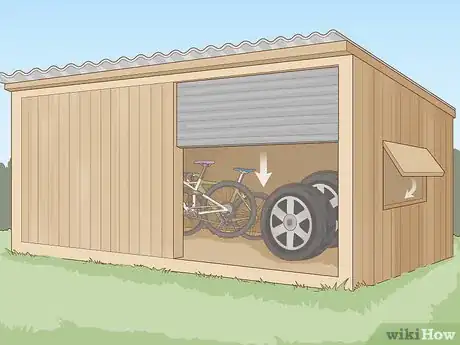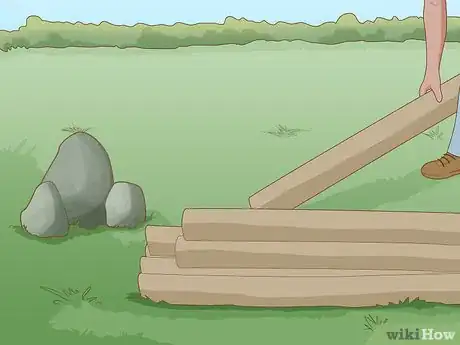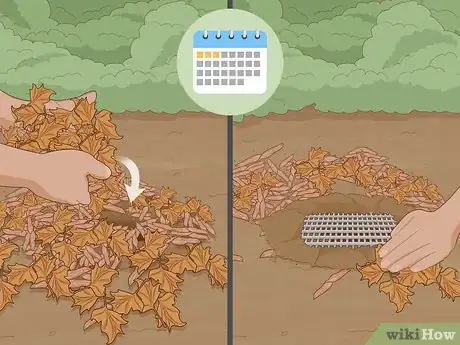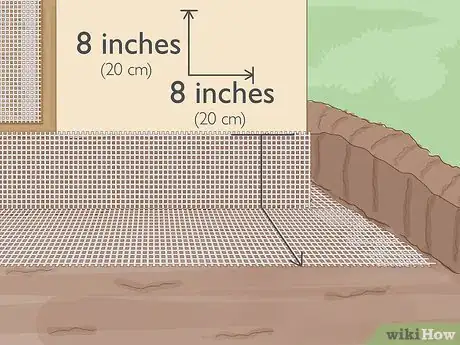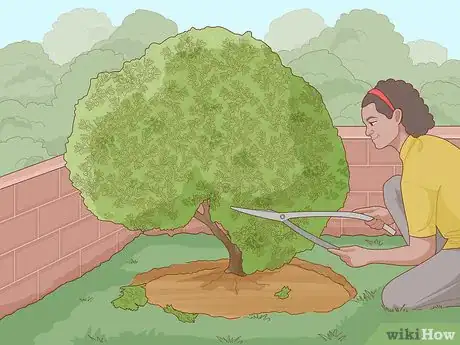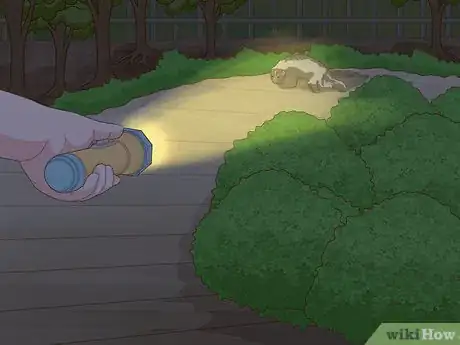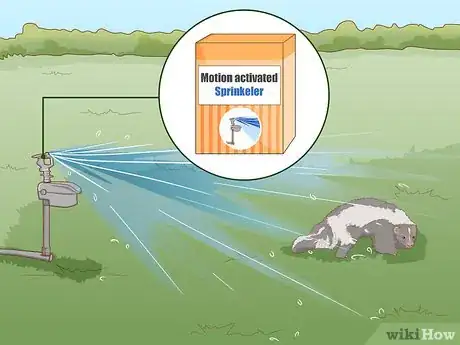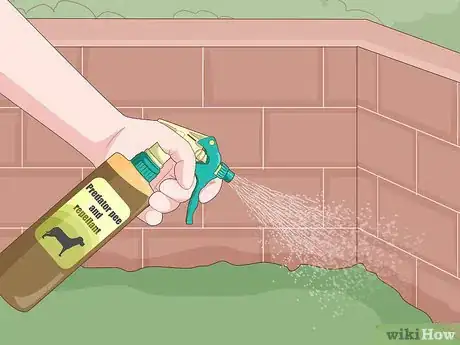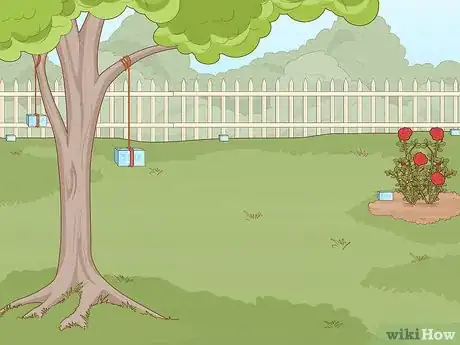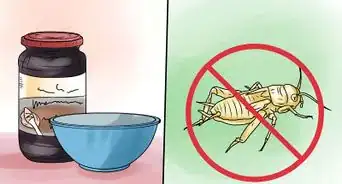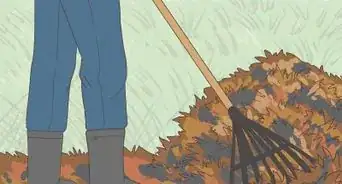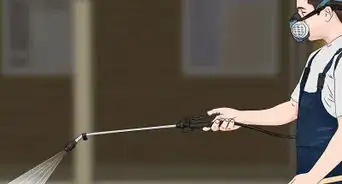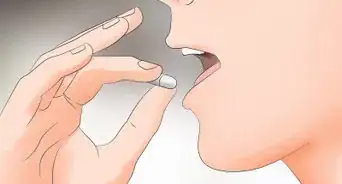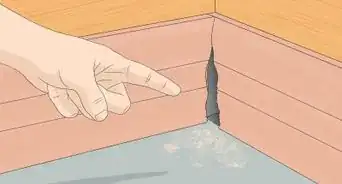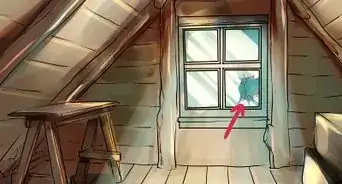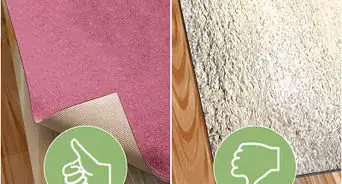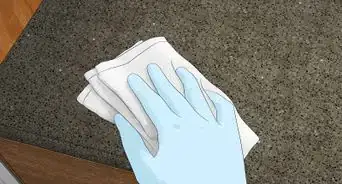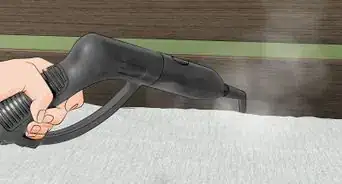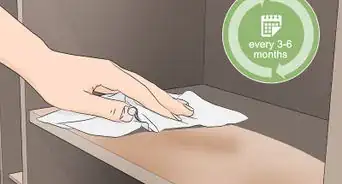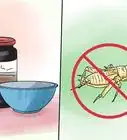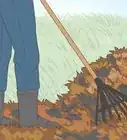This article was co-authored by wikiHow staff writer, Megaera Lorenz, PhD. Megaera Lorenz is an Egyptologist and Writer with over 20 years of experience in public education. In 2017, she graduated with her PhD in Egyptology from The University of Chicago, where she served for several years as a content advisor and program facilitator for the Oriental Institute Museum’s Public Education office. She has also developed and taught Egyptology courses at The University of Chicago and Loyola University Chicago.
There are 8 references cited in this article, which can be found at the bottom of the page.
This article has been viewed 22,822 times.
Learn more...
Although skunks are famous for their bad-smelling spray, they’re typically non-aggressive and can coexist with humans peacefully. Sometimes, however, a skunk may dig up your garden or move in under your deck, which can be a nuisance and put your or your pets at risk of unpleasant encounters. To keep skunks away from your house and yard, make sure to remove tempting sources of food, like garbage or pet food. You can also block off areas where skunks might want to make dens. To scare skunks away, try using scent, light, or sound-based repellents.
Steps
Removing Food Sources
-
1Keep your garbage well contained. Like many wild animals, skunks will happily scavenge human food garbage if you leave it where they can get at it.[1] If you put your garbage outside, choose sturdy containers with lids that close securely, so that skunks and other nighttime visitors can’t knock them over or climb inside for a snack.
- Don’t leave any exposed food garbage outdoors. For example, if you have a backyard barbeque or picnic, throw away any trash and scraps when you’re done.
-
2Feed your pets indoors. If you have dogs, cats, or other pets that go outside, feed them indoors as much as possible. Otherwise, skunks may be attracted by uneaten food in their dishes.[2]
- If you feed your pets outdoors, bring the food dishes in at night or as soon as your pet is finished eating.
Advertisement -
3Put trays under bird feeders to catch fallen seed. If you have bird feeders in your yard or garden, skunks may be attracted to seed that the birds spill on the ground. One way to minimize the amount of seed that falls is to attach a tray or tub to the bottom of the bird feeder to catch any seed that falls out. Just make sure to empty the tray frequently so it doesn’t overflow.
- If possible, choose a tray with a mesh bottom so that it will catch falling seeds but not become waterlogged if it rains.
- You can also minimize spillage by filling each feeder with a single type of seed. That way, birds won’t make a mess by picking out and discarding the seeds they don’t like.
-
4Use natural pesticides to control grubs on your lawn. Skunks love to eat grubs, so managing a grub problem is a good way to make your yard or garden less attractive to them. You can try treating your lawn with milky spore powder, a natural pesticide available in most home or garden supply stores, in the late summer or early autumn.[3]
Tip: Overwatering your lawn can drive grubs up to the surface, where skunks can get at them more easily.[4] Make sure you are watering your lawn properly to avoid this problem.
-
5Pick up fallen fruit or nuts from your lawn. Skunks are omnivores, meaning they will eat fruit and nuts as well as insects and other small animals. If you have any trees in your yard that produce fruit, berries, or nuts, pick up anything that falls out of the tree promptly.[7] You might find it helpful to rake your yard to more easily remove any edible debris.
- Try to pick ripe fruit or nuts from trees promptly before they fall on their own. If you have a garden, harvest any fruits and vegetables as they become ripe.
- Most skunks aren’t good climbers, so they’re unlikely to be able to get at fruit that’s still in the tree.
Preventing Skunks from Denning
-
1Seal off spaces under decks. Skunks like to hole up under decks, sheds, porches, and crawl spaces. To prevent this from happening, seal off any open areas with chicken wire fencing. To keep skunks from digging or squeezing under, you’ll need to make sure the chicken wire extends at least 1 foot (30 cm) under the ground.[8]
- If there’s already a skunk living under your deck or another structure on your property, you will need to scare it out before sealing the area off. Try encouraging the skunk to leave by setting up a bright light or an ultrasonic deterrent to frighten it away.[9]
- Before setting up any deterrents, wait until you’re pretty sure the skunk is away from its den.
-
2Close any sheds or other outbuildings. If you have a backyard shed, garage, or other outbuilding that a skunk can easily wander into, close it up and secure any possible entrances. Otherwise, skunks may come in to seek shelter or look for food.[10]
- Check for holes or gaps that a skunk could get into and seal them off with wire mesh or another suitable material, such as cement or plaster.
-
3Remove rock or wood piles from your yard. Piles of debris make tempting shelters for skunks. If you suspect you have a skunk in your yard, clear away any large piles of rocks, sticks, wood, junk, or lawn waste that it could be hiding under.
- If you keep a firewood pile in your yard and are concerned about skunks denning under it, try putting a fence around it or spraying the area with a skunk deterrent, such as a castor oil spray or a commercial skunk repellent.
- You can also store cut lumber or firewood in a closed shed or other outbuilding, if you have one.
-
4Block off any unoccupied skunk dens. If you find a suspected skunk den, loosely fill the hole with a light material, such as dead leaves, straw, crumpled paper, or dirt. If the den is occupied, the skunk will be able to push its way out. If the material remains undisturbed for 2-3 days, you can assume the den is unoccupied and seal it off more permanently, e.g., by blocking it off with wire.[11]
- If the den is still occupied, one option is to install a 1-way door at the entrance to the den. This device will allow skunks to leave the den, but they will not be able to go back inside once they’ve left. You can buy 1-way animal doors online or from many home or garden supply stores.
- You can also try scaring any current occupants out of the den with a natural repellent or a sound or light deterrent.
Tip: If there are any baby skunks in the den, wait until they are old enough to leave the den and forage before trying to scare out the skunks.
-
5Use fencing around chicken coops or other animal enclosures. Skunks are a major barnyard pest due to their tendency to raid chicken coops and eat the eggs. If you keep chickens or other livestock that skunks might be interested in, secure the area by putting wire fencing around the coop. Make sure the wire extends at least 8 inches (20 cm) under the ground around the coop. Ideally, it should also extend horizontally away from the enclosure another 8 inches (20 cm), so that it forms an L shape.[12]
- Skunks also like to eat bees and their larvae. If you keep bees, keep the hives elevated so that skunks can’t easily reach them.
-
6Trim back bushes so they don’t provide cover. Skunks like to den under bushes and shrubs. If you have any plants in your yard with low-hanging branches, prune them back so they don’t offer as much shelter.[13]
- If you have any fallen trees or branches in your yard, remove those promptly so that they don’t provide easy shelter for skunks.
Using Repellents
-
1Spray castor oil and dish soap in areas where skunks den or forage. Skunks dislike the smell of castor oil.[14] You can easily make a safe and natural skunk deterrent by mixing 8 fluid ounces (240 mL) of castor oil, 8 fluid ounces (240 mL) of liquid dish detergent, and 1 gallon (3.8 L) of water and putting the mixture in a spray bottle or canister. Spray the mixture around a suspected skunk den or any areas where you think skunks are messing around on your property.[15]
- You can also use capsaicin oil, or hot pepper spray, to deter skunks. However, these sprays can be very irritating to both humans and animals, so take care when using them.[16]
-
2Scare skunks away with lights or noisemakers. Bright, flashing lights are alarming to skunks, and can be an effective deterrent in dens and garden areas and around animal enclosures or trash cans. Look for a light-based animal deterrent and set it up in an area where skunks are active. You can also use repellents that emit loud or high-pitched noises, or even use something like a portable radio to play noise that skunks will find unpleasant.[17]
- You can buy light and sound-based outdoor animal deterrents online or at most home or garden supply stores.
Keep in mind: Skunks can get used to these kinds of deterrents eventually, so you may need to switch to a new tactic after a while or use them in combination with other deterrents.
-
3Try a motion-activated sprinkler to discourage skunks. Sprinklers can startle skunks and scare them away. Place a motion-activated sprinkler in an area where skunks are likely to cause trouble, such as next to your vegetable garden.[18]
- If you happen to catch a skunk in action, you can also try blasting it with a garden hose from a safe distance.
-
4Use predator urine repellents in areas where skunks live or gather. Urine-based repellents, usually made with the urine of dogs or coyotes, can also be effective at scaring away skunks. You can buy these repellents online or at a home or garden supply store or sporting goods store. Spray them around suspected dens or in other areas where you want to keep skunks away.[19]
- If you choose to use a urine-based repellent, research the company that produces it to make sure they use humane practices when collecting the urine.
- You may also be able to scare skunks away by sprinkling a little used kitty litter in problem areas, such as around the entrances to dens.[20]
-
5Place scented soaps or deodorizers around your garden. Many smells that are designed to appeal to humans are unpleasant to skunks. One simple and gentle method for deterring skunks is to place strongly scented household products in areas where they like to forage. Try putting some perfumed bars of soap or room deodorizers around the area.[21]
- You can also try placing orange peels or rags soaked with ammonia in the area.
Warnings
- If you see a skunk out in the middle of the day behaving strangely, don’t approach it. If the skunk acts unusually bold or aggressive, or if it shows behaviors such as circling, staggering, or dragging its limbs, it may have rabies. Call animal control, a wildlife rehabilitator, or your local health office if you observe these behaviors.[22]⧼thumbs_response⧽
- If you encounter a skunk, watch out for warning signs that it is upset and likely to spray. It may display threatening behaviors such as stamping its feet, hissing, charging at you, raising its tail, or twisting its rear end toward you. Back away slowly and quietly if you see a skunk displaying these behaviors.[23]⧼thumbs_response⧽
References
- ↑ https://www.humanesociety.org/resources/what-do-about-skunks
- ↑ https://www.wildlifecenter.org/skunks-neighbors
- ↑ https://www.wildlifecenter.org/skunks-neighbors
- ↑ https://www.humanesociety.org/resources/what-do-about-skunks
- ↑ https://www.canr.msu.edu/news/lawn_fertilization_tips_really
- ↑ https://www.almanac.com/pest/skunks
- ↑ https://wcsv.org/education/species/skunk/
- ↑ https://www.almanac.com/pest/skunks
- ↑ https://www.humanesociety.org/resources/what-do-about-skunks
- ↑ https://www.humanesociety.org/resources/what-do-about-skunks
- ↑ https://www.humanesociety.org/resources/what-do-about-skunks
- ↑ https://www.wildlifecenter.org/skunks-neighbors
- ↑ https://www.cherryhill-nj.com/DocumentCenter/View/1854/Tips-to-deter-skunks-nuisance-wildlife-from-your-property?bidId=
- ↑ https://www.almanac.com/pest/skunks
- ↑ https://www.cheltenhamtownship.org/pview.aspx?id=3110&catid=0
- ↑ https://www.humanesociety.org/resources/what-do-about-skunks
- ↑ https://www.wildlifecenter.org/skunks-neighbors
- ↑ https://latimesblogs.latimes.com/home_blog/2012/04/how-to-get-rid-of-coyotes-skunks-raccoons-.html
- ↑ https://www.almanac.com/pest/skunks
- ↑ https://www.humanesociety.org/resources/what-do-about-skunks
- ↑ https://www.almanac.com/pest/skunks
- ↑ https://www.humanesociety.org/resources/what-do-about-skunks
- ↑ https://www.humanesociety.org/resources/what-do-about-skunks
